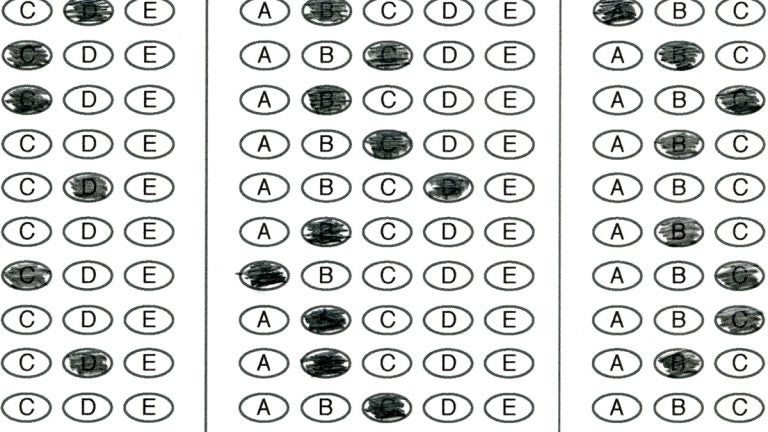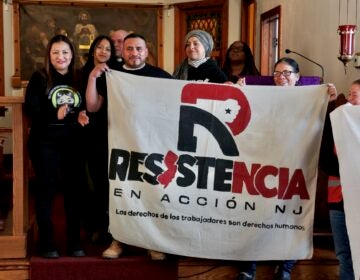Commentary: N.J.’s anti-testing movement is more about teachers than students

The politics of standardized testing has kicked into overdrive in New Jersey. Last Friday the “Study Commission on the Use of Student Assessments in New Jersey” issued its Interim Report. Earlier this week, New Jersey Education Association and Save Our Schools-NJ released a “survey” on state standards and national assessments. Yesterday NJ Spotlight reported that a new coalition called We Raise NJ is “hoping to ratchet down the volume of the argument” about whether the new PARCC standardized tests are over-stressing students, teachers, and school districts.
But all this dissension about new student assessments has little to do with student well-being. Instead, this uproar is about whether New Jersey should backtrack on a bipartisan teacher tenure reform bill, TEACHNJ, which ties teacher evaluations to student outcomes. In other words, this is about job security, not student security.
The Study Commission was created last July through an Executive Order from Gov. Christie, which effectively stymied NJEA and SOS-NJ’s efforts to delay by two years the impact of PARCC tests on teacher and school ratings. Christie’s edict lowered the proportion of teacher evaluations that would be infused with student data — from 30% to 10% — and also set up the Study Commission. The Interim Report issued last week sums up the Commission’s purpose succinctly: “Members briefly discussed the need to explore the issue of overtesting, whether it is a real issue or a perception, and the need to address the issue even it is a perception. The members determined it would explore the issue further, along with the politicization of the conversation surrounding standards and assessments.”
NJEA and Save Our Schools-NJ have helpfully answered these questions for the Study Commission: it’s student stress, not job security. This is the findings of a push poll that purports to measure parent antipathy towards PARCC tests.
Let’s unpack this a bit. The flawed survey asks 400 parents whether or not they know anything about PARCC tests. Fifty-eight percent of respondents know “not too much” or “nothing at all.” Despite the preponderance of ignorance, NJEA/SOS-NJ then asks those same people if PARCC tests “take time and money away from other educational priorities,” whether ‘teachers are forced to teach to the test,” whether “The tests are given too much weight when used to make decisions on teachers.” (Reality check: administration of PARCC tests will take up 1-2 percent of school calendars, slightly more than N.J.’s older tests, and cost about the same.)
The poll also test-drives future lobbying language, gauging whether voters respond more negatively to the words “federal” or “national” in relation to the Common Core State Standards that the PARCC tests are aligned with. (Another reality check: the Common Core is state-driven, although the Obama Administration offered an incentive to sign on.)
In a Star-Ledger Op-ed this week publicizing the poll, NJEA President Wendell Steinhauer and SOS-NJ President Susan Cauldwell allege that “New Jersey intends to use [PARCC tests] to make decisions about whether students can graduate from high school, whether teachers will be fired, and whether schools will be closed.” To a tiny extent the second allegation is true because TEACHNJ ties tenure to classroom effectiveness. But high school students have long been required to pass graduation tests and there are alternative graduation pathways. Also, no schools will be closed due to results on PARCC tests.
In response to the anti-testing lobby, NJ Spotlight reports that there’s a new coalition, We Raise NJ, which operates under the auspices of the N.J. PTA. Members include the N.J. Principals and Supervisors Association, N.J. School Boards Association, and N.J. Association of School Administrators. The incoming head of the N.J. PTA told Spotlight that “there is a small group of parents making noise, but I think there are more who are looking up to us to give them information.”
Indeed, information is power, at least when it’s not distorted by political lobbying groups. Schools are rising to the challenge of providing the straight scoop. For example, this week Camden Superintendent Paymon Rouhanifard announced a series of family meetings and online resources to help families learn about PARCC. In Nearby Mt. Laurel, Superintendent Antoinette Rath reminded parents this week that,
“Where Mount Laurel’s students and staff are concerned, the PARCC Test takes the place of the NJ ASK, which takes the place of the IOWA, the TerraNova, or any of their precursors. While they are by no means the single determinant of a student’s range of knowledge or talent, they do offer us measurable outcomes upon which to proceed in providing the best possible education for every child.”
That’s the key: states use standardized tests, whether we call them ASK or HSPA or PARCC, to gauge student proficiency, amplify parental knowledge of school quality, and, to a very small extent, measure teacher effectiveness. It’s that last piece that’s ignited N.J.’s anti-testing cadre, and that has nothing to do with kids.
_________________________________________________Laura Waters is vice president of the Lawrence Township School Board in Mercer County. She also writes about New Jersey’s public education on her blog NJ Left Behind. Follow her on Twitter @NJLeftbehind.
WHYY is your source for fact-based, in-depth journalism and information. As a nonprofit organization, we rely on financial support from readers like you. Please give today.





